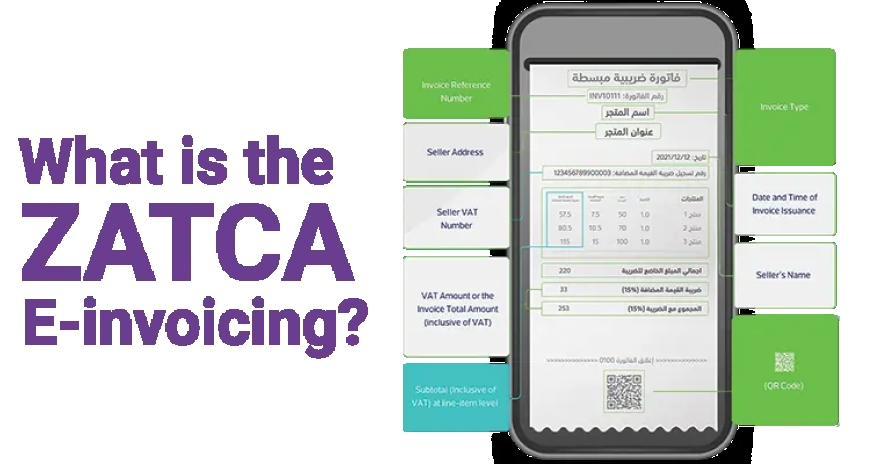Understanding ZATCA Phase 2: Why ERP Integration is Crucial for E-Invoicing Compliance
Learn how the integration of ERP systems enables both compliance regulation and time-saving.

The Zakat Tax and Customs Authority of Saudi Arabia leads the digital transformation effort by prioritizing electronic invoicing within their country. Since December 2021 Phase 1 of e-invoicing established electronic invoice generation and storage requirements for all businesses. The officially named Integration Phase represents Phase 2 which stands as the most technologically complex stage in the system. The system operates with the purpose of facilitating real-time invoice sharing and verification between connected systems.
This blog examines the ZATCA e-invoicing Phase 2 requirements which require more than invoice digitization and explains why the best erp in Saudi Arabia integration plays a vital role in achieving complete compliance.
What ZATCA Phase 2 Really Means
The main focus of ZATCA E-Invoicing Phase 2 exists in integrating multiple systems. ZATCA's platform requires electronic connection from businesses starting in January 2023 with future implementation phases for different-sized organizations. The integrated system enables ZATCA's systems to automatically verify and clear invoices at the same time of their creation. Phase 2 establishes different requirements from Phase 1 because businesses must maintain every invoice in a specific format while real-time clearance processes must occur alongside cryptographic stamping with UUID insertion.
Why ERP Integration is Critical for Compliance
Manual compliance with ZATCA E-Invoicing Phase 2 creates both safety and performance issues. The real-time e-invoice validation requirement by ZATCA forces companies to implement ERP integration. A company's ERP system produces invoices through an automated process which formats invoices before ZATCA receives them without any human operator involvement. The integration of ERP systems enables both compliance regulation and time-saving along with decreased human mistakes.
Every department benefits from consistent data through an ERP system that links all departments together. The data used for invoice generation always matches inventory data and sales and accounting records because every transaction goes through a centralized system. Consistent data management in invoicing reduces the risk of audit rejections because it minimizes discrepancies that might occur from human mistakes.
Staying Ready for Audits and Record-Keeping
ZATCA E-Invoicing requires organizations to securely store both electronic invoices along with their supporting data. The accounting software in uae provide tamper-proof archiving functions to safely store invoice records which comply with security regulations. Businesses can successfully retrieve audit-requestable invoices and their digital signatures and verification data during any audit examination. The lack of traceable security features in manual systems produces numerous compliance issues that businesses must overcome.
What Happens Without ERP Integration
The process of meeting Phase 2 requirements becomes complicated when ERP integration is not applied. Businesses must perform manual invoice data entry and file reformatting and upload tasks to satisfy submission requirements. The use of manual processes creates multiple data entry mistakes and delayed invoice processing which eventually results in regulatory violations.
Choosing the Right ERP for ZATCA Compliance
The ZATCA E-Invoicing in Saudi Arabia Phase 2 compliance requires businesses to verify that their ERP system has all necessary tools to integrate with ZATCA in real time. Businesses should select an ERP system that can automatically create XML invoices while providing secure cryptographic stamping capabilities and API-based interface to ZATCA's platform and a friendly interface for monitoring invoice statuses and sending alerts.
How Sowaan ERP Simplifies Compliance
Sowaan ERP shows its suitability for Saudi Arabian businesses because it was designed specifically for ZATCA Phase 2 requirements. The system arrives with all ZATCA-specific technical requirements satisfied which enables real-time invoice approval together with automatic billing and secure document storage. Sowaan ERP uses certified APIs to connect with Fatoora platform for instant invoice validation and submission.
Final Thoughts
Saudi Arabia advances its digital tax and financial transparency initiatives through ZATCA Phase 2. Businesses face difficulties within this phase yet they gain a chance to update their internal processes and minimize operational issues. Current market conditions demand that ERP integration becomes mandatory for all businesses.
Businesses that implement Sowaan ERP for their operations will achieve compliance with regulations and obtain operational advantages. Businesses must not delay their preparations since non-compliance will eventually result in financial costs. Your company needs to prepare currently while integrating systems to achieve complete control of your invoicing operation.



















































































